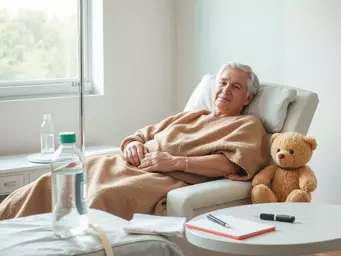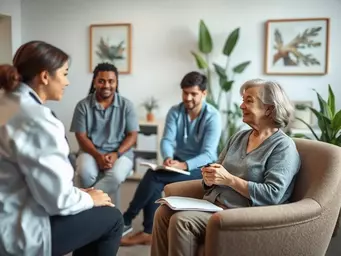Support Resources During Chemotherapy
By Dr. Elise Carter / Jan 28
Ever felt overwhelmed by the prospect of chemotherapy? You're not alone. Understanding the potential side effects can transform your experience, allowing you to take charge of your treatment journey.
Understanding and managing chemotherapy side effects is crucial for patients. This visual outlines common side effects and key strategies for coping.
Overwhelming tiredness; manage with rest, gentle exercise, good nutrition.
Can be immediate or delayed; manage with anti-nausea meds and food tracking.
Starts 1-2 weeks after treatment; varies by drugs; consider hats/wigs.
Tingling/numbness, rashes. Report to team for interventions.
Eat small, frequent meals; focus on nutrient-dense foods; consult nutritionist.
Painful sores; maintain oral hygiene, discuss specific mouthwashes with doctor.
Incorporate specific foods to alleviate nausea and support overall health.
Even light exercise can combat fatigue and improve energy levels.
Mindfulness and relaxation are essential for managing stress and mental well-being.
Keep a dialogue with your healthcare team about any symptoms you experience.
As someone who works closely with individuals facing cancer, I understand that the term chemotherapy side effects can invoke a sense of fear and uncertainty. It's crucial to equip yourself with knowledge about what these side effects may entail. This understanding can not only help alleviate some anxiety but also empower you to better manage your treatment journey.
It’s important to remember that everyone’s experience with chemotherapy is unique. While some patients might encounter a range of side effects, others may feel relatively well during treatment. Let’s explore some of the most common side effects associated with chemotherapy.
For a comprehensive list and detailed information on managing these effects, resources like the American Cancer Society offer valuable insights.
Understanding these common side effects can provide a clearer picture of what to expect. It’s essential to discuss your specific concerns with your healthcare team, as they can offer personalized advice and strategies to help manage these symptoms effectively.
One of the most frequent side effects reported by patients is fatigue. This isn’t just ordinary tiredness; it can feel overwhelming and may stem from a combination of factors, including the body’s response to treatment and emotional stress. Have you ever experienced a fatigue so profound that even simple tasks feel monumental?
While it can be frustrating, recognizing the source of your fatigue can help you find effective coping strategies. You might find that rest, gentle exercise, and good nutrition can make a difference. Remember, it’s okay to take breaks and listen to your body’s needs.
Nausea is another common side effect that can catch patients off guard. It can occur shortly after chemotherapy infusions or may be delayed for several days. Understanding that this is a common reaction can help you prepare. To manage nausea, I always recommend discussing anti-nausea medications with your oncologist. For more information on managing these symptoms, the Mayo Clinic provides in-depth guidance.
Have you considered keeping a food diary? Tracking what you eat and how it makes you feel can help identify patterns that may ease your symptoms. It’s all about finding what works best for you!
For many, the prospect of hair loss can be one of the most distressing side effects of chemotherapy. This can start as early as a week or two after treatment begins, and it can vary depending on the specific drugs used. It’s important to know that not everyone will experience complete hair loss; some may notice thinning instead. The Memorial Sloan Kettering Cancer Center offers further details on managing hair loss and other side effects.
How do you feel about this possibility? Embracing this change can be difficult, but many patients find comfort in exploring creative solutions such as hats or wigs. Consider this an opportunity to express yourself in new ways!
Another side effect that some patients experience is neuropathy, which can manifest as tingling or numbness in the hands and feet. Skin changes, including rashes or increased sensitivity, can also occur. Recognizing these symptoms early will enable you to discuss them with your healthcare team.
Have you noticed any unusual sensations in your body? Keeping your medical team informed can help them provide interventions that alleviate discomfort.
Changes in appetite and potential weight loss are also common during chemotherapy. You might find that certain foods no longer appeal to you, or perhaps you’re feeling too nauseous to eat. Maintaining good nutrition is vital, so it’s essential to find ways to consume enough calories and nutrients.
How do you currently approach your meals? Finding joy in food again can be a gradual process, but remember, you’re not alone in this journey.
Lastly, let’s discuss mouth sores, which can be painful and may affect your ability to eat or drink. These sores can develop due to the impact of chemotherapy on the cells lining your mouth. It’s important to maintain oral hygiene and address any discomfort you experience.
Have you spoken with your doctor about mouth care routines? They may recommend specific mouthwashes or medications to help soothe any soreness.
As you reflect on your chemotherapy journey, what has been the most impactful strategy for managing your side effects? Share your thoughts below:
As you navigate through chemotherapy, understanding the side effects and implementing effective management strategies can greatly enhance your experience. Here are some key takeaways to empower you on your journey:
Remember, your treatment journey is uniquely yours. By adopting these strategies, you can take an active role in managing your health and well-being throughout chemotherapy.
Practicing self-care during chemotherapy isn’t just beneficial; it’s essential. As patients, we often focus on the treatment itself, overlooking the significance of caring for our mental and emotional health. Have you considered how small acts of self-kindness can make a big difference? Here are some self-care practices to consider:
Each of these practices not only fosters resilience but also enhances your overall treatment experience. Recognizing the importance of self-care can empower you to face the challenges ahead.
One of the most effective ways to manage chemotherapy side effects is by maintaining open communication with your healthcare team. They are your allies in this journey, equipped with knowledge and resources to help you through. How often do you discuss your symptoms or concerns with them? Here are some tips to encourage better communication:
By fostering a strong partnership with your healthcare providers, you’re not just a passive patient; you’re an active participant in your health journey.
As you move forward, it’s crucial to know that you don’t have to navigate this journey alone. There are abundant resources and support systems available to assist you during treatment. Have you explored what’s out there? Here’s a summary of beneficial next steps:
Connecting with others who understand your experience can be invaluable. Support networks and communities provide emotional support and practical tips. Consider reaching out to:
Building these connections can help you feel less isolated and more understood during your treatment process.
Your oncology team is your go-to resource for personalized advice. Have you thought about scheduling regular check-ins? They can provide tailored guidance based on your unique health profile and treatment response. Here’s how to maximize these consultations:
Each appointment is an opportunity to refine your approach and receive the support you need to feel your best.
Taking an active role in your treatment plan is empowering. Understanding the specifics of your chemotherapy regimen can significantly impact your overall experience. Have you reviewed your treatment plan thoroughly? Here are some steps to enhance your understanding:
Knowledge is power, especially when it comes to managing your health. By staying informed, you can make better decisions that align with your goals and comfort.
Here is a quick recap of the important points discussed in the article:

 Support Resources During Chemotherapy
Did you know that support resources can significantly ease the journey through chemotherapy? Underst
Support Resources During Chemotherapy
Did you know that support resources can significantly ease the journey through chemotherapy? Underst
 Supporting Mental Health in Chemotherapy
When you think about cancer treatment, how often do you consider the emotional toll it takes on pati
Supporting Mental Health in Chemotherapy
When you think about cancer treatment, how often do you consider the emotional toll it takes on pati
 Chemotherapy's Impact on Relationships
Have you ever considered how a cancer diagnosis can reshape the relationships around you? The emotio
Chemotherapy's Impact on Relationships
Have you ever considered how a cancer diagnosis can reshape the relationships around you? The emotio